

Martin Heidegger - Der Spiegel Interview (1966) Troubling new revelations about Arendt and Heidegger. Will we ever be able to think of Hannah Arendt in the same way again?

Pragmatism. Pragmatism is a philosophical tradition that began in the United States around 1870.[1] Pragmatism is a rejection of the idea that the function of thought is to describe, represent, or mirror reality[citation needed].
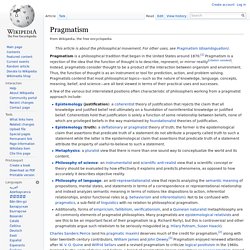
Instead, pragmatists consider thought to be a product of the interaction between organism and environment. Thus, the function of thought is as an instrument or tool for prediction, action, and problem solving. Pragmatists contend that most philosophical topics—such as the nature of knowledge, language, concepts, meaning, belief, and science—are all best viewed in terms of their practical uses and successes. A few of the various but interrelated positions often characteristic of philosophers working from a pragmatist approach include: Charles Sanders Peirce (and his pragmatic maxim) deserves much of the credit for pragmatism,[2] along with later twentieth century contributors, William James and John Dewey.[3] Pragmatism enjoyed renewed attention after W.
Origins[edit] Edmund Husserl. The Heidegger in All of Us - December 2, 2009. The Heidegger in All of UsWhether we like it or not...
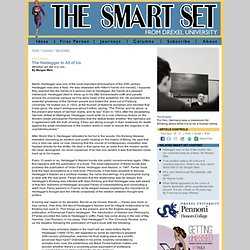
Martin Heidegger was one of the most important philosophers of the 20th century. Heidegger was also a Nazi. He was obsessed with Hitler's hands (his hands!). I suppose they seemed like the hands of a serious man to Heidegger, the hands of a peasant intellectual. Heidegger liked to dress up in his little Schwarzwald outfit and parade around his university campus as if he were head of the academic SS. After World War II, Heidegger retreated to his hut in the woods. Every 10 years or so, Heidegger's Nazism bursts into public consciousness again. A boring war raged on for decades.
How many scholarly stakes in the heart will we need before Martin Heidegger (1889-1976), still regarded by some as Germany's greatest 20th-century philosopher, reaches his final resting place as a prolific, provincial Nazi hack? The coffin is sealed. All this makes a person wonder how the dwarfish Hitlerite made it into the curriculum in the first place. Heidegger: Thinking the Unthinkable. German philosopher Martin Heidegger addressed the central question of human existence full on, by examining how human self-awareness depends on concepts of time and death.
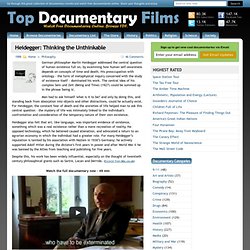
His preoccupation with ontology - the form of metaphysical inquiry concerned with the study of existence itself - dominated his work. The central idea of his complex Sein und Zeit (Being and Time) (1927) could be summed up in the phrase 'being is'. Man had to ask himself 'what is it to be? ' and only by doing this, and standing back from absorption into objects and other distractions, could he actually exist. Dr. Heideggers Experiment. Hawthorne, Nathaniel, 1804-1864 .
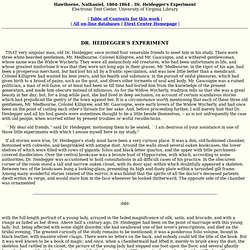
Dr. Heidegger's Experiment Electronic Text Center, University of Virginia Library | Table of Contents for this work | | All on-line databases | Etext Center Homepage | THAT very singular man, old Dr. ``My dear old friends,'' said Dr. If all stories were true, Dr. Why they're really scared of Heidegger.
Not literally burn them, of course; the irony would surely be too much even for the most historically forgetful.
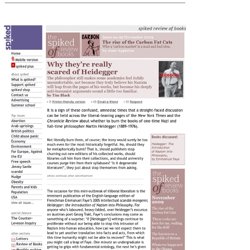
No, should they be metaphorically burnt? That is, should publishers stop churning out new editions of his collected works, should libraries cull him from their collections, and should university courses purge him from their syllabuses? ‘Is it degenerate literature?’ , they just about stop themselves from asking. article continues after advertisement. Heidegger Lectures. Being and Time, part 1: Why Heidegger matters Simon Critchley. Martin Heidegger (1889-1976) was the most important and influential philosopher in the continental tradition in the 20th century.
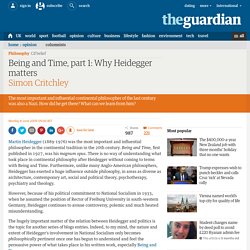
Being and Time, first published in 1927, was his magnum opus. Www9.georgetown.edu/faculty/blattnew/heid/PHIL-382-06Csyllabus.pdf. Being & Time Links. Being & Time Links This page contains links to items on the internet about the work Being & Time by the German philosopher Martin Heidegger (1889-1976).
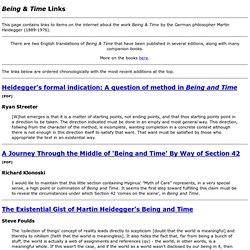
There are two English translations of Being & Time that have been published in several editions, along with many companion books. More on the books here. The links below are ordered chronologically with the most recent additions at the top. Reactions to Heidegger's 'Being and Time' Glossary of Terms in Heidegger's Being and Time. So there is always a residual quality to nature, something present-at-hand, which becomes apparent only after nature has been discovered as a resource.
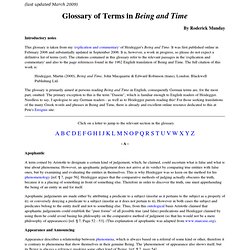
Although this surplus is, paradoxically, the very thing that allows us to contemplate that which has been discovered as a 'something' in its own right. What Heidegger has done here is reversed the normal conception of nature, as something which is taken up (exploited) by humanity in the form of natural resources. However, he argues the problem with this view is it can never make visible the resource structure of nature itself, which is actually what defines the relationship of Dasein towards nature. And thus, nature is always conceived of a something metaphysical (It is a thing that exists, but one can never quite pin down its existence to objects). Ontic (ontical) Ontic inquiries are concerned with knowledge about entities that are not Dasein. Ontology. Being and Time. Martin Heidegger. Martin Heidegger (German: [ˈmaɐ̯tiːn ˈhaɪdɛɡɐ]; 26 September 1889 – 26 May 1976) was a German philosopher, widely seen as a seminal thinker in the Continental tradition, particularly within the fields of existential phenomenology and philosophical hermeneutics.

From his beginnings as a Catholic academic, he developed a groundbreaking and widely influential philosophy. His relationship with Nazism has been a controversial and widely debated subject. For Heidegger, the things in lived experience always have more to them than what we can see; accordingly, the true nature of being is “withdrawal”. The interplay between the obscured reality of things and their appearance in what he calls the “clearing” is Heidegger's main theme. The presence of things for us is not their being, but merely their being interpreted as equipment according to a particular system of meaning and purpose.
It has been suggested[by whom?] Biography[edit] Early years[edit] Marburg[edit]